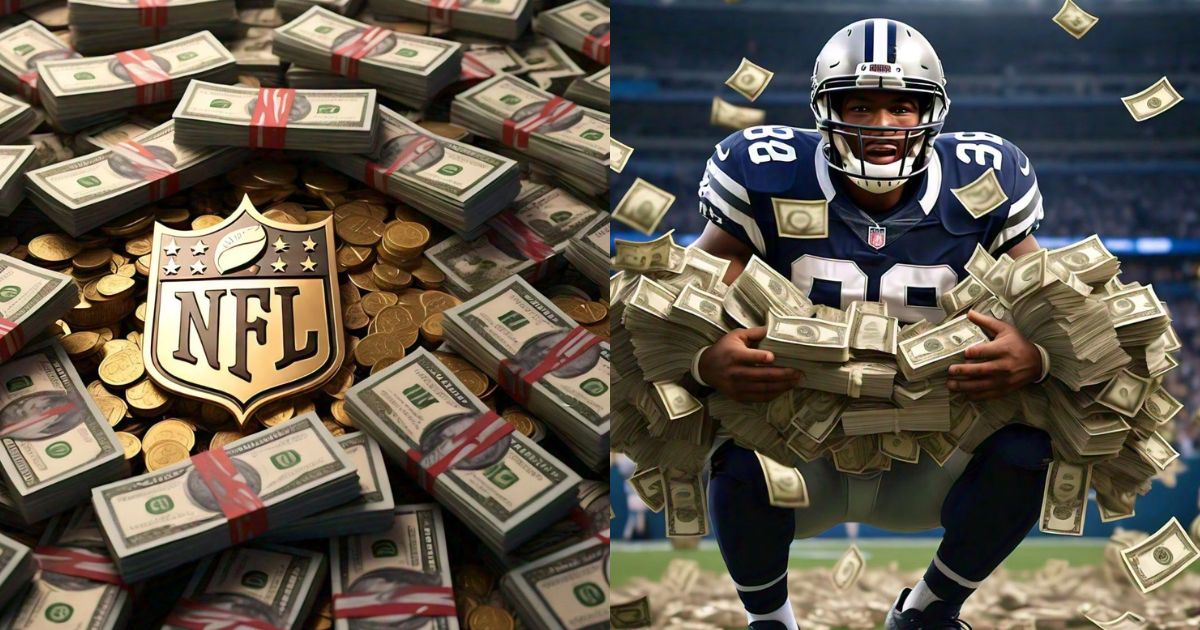Many fans are curious about how and when NFL players receive their salaries or get paid monthly because the financial parts of the players’ careers can be complicated.
The pay structure for NFL players is different from that of a regular 9–5 worker who get paid monthly since it considers the demands of the league schedule and the nature of their employment.
Let’s look at how NFL players are compensated, including when they get paid, what bonuses and incentives mean, and how crucial money management is.
Quickly Navigate
Payment Schedule Overview
NFL players have a special payment schedule that coincides with the football season, unlike many standard professionals get paid monthly basis.
Rather than being paid a fixed amount each month, they are paid during certain times in the league calendar.
This method makes sure that players receive pay appropriate to the structure and needs of their industry.
Regular Season Paychecks
NFL players get their salary distributed to them in weekly installments throughout the regular season.
Players receive their weekly salary from the beginning of the regular season until the last game not like others get paid monthly.
For instance, players will get paid for 17 weeks in a regular season. Because of this arrangement, the majority of their yearly pay is disbursed over a comparatively short time.
Offseason Payments
There are chances to make money over the offseason even if an NFL player’s salary is mostly paid during the regular season.
Participation in minicamps, offseason training, and other team events may result in payment for players.
These payouts, which differ depending on the team and the conditions of the contract, are typically less than regular season salaries.
Signing Bonuses and Other Lump Sums
NFL players frequently earn signing bonuses and other lump-sum payouts as part of their contracts, in addition to their monthly salary.
Usually given upfront when a player accepts a contract, a signing bonus is guaranteed to be paid out regardless of future performance or injury.
Although the player receives the entire amount up front or in the first year, these incentives can be sizable and are frequently distributed throughout the contract for salary cap concerns.
Incentives and Performance Bonuses
An NFL player’s income can be greatly impacted by performance-based bonuses and incentives, which honor great play instead of get paid monthly.
These bonuses, which are detailed in the player’s contract, may be awarded for attaining certain goals like touchdowns, yards, or Pro Bowl selection.
In addition to giving players more incentive to do well on the field, these bonuses have the potential to significantly raise their overall income.
Practice Squad Players
Players on the practice squad are paid differently; during the season, their wages are usually divided weekly.
These players are given a set weekly salary instead of the same compensation as players on the active roster.
To ensure that practice squad players get adequate payment for their contributions to the team, the NFL establishes minimum compensation.
Financial Management and Planning
For NFL players to secure long-term financial stability, financial planning and management are essential due to the special payout schedule.
Since most of their profits are earned during the regular season, players need to carefully plan their spending.
To make safe financial investments, prepare for taxes, and make sure they have enough money to sustain themselves and their families both during the offseason and when their careers end, many athletes consult with financial consultants.
Read More: What Do NFL Players Do After Retirement?
Tax Considerations
NFL players have to deal with complicated financial issues because they have to pay federal, state, and occasionally local taxes on their income.
Players must file tax returns in each state where they make money because they frequently play games and earn cash in many states.
To make sure compliance and maximize their tax situation, this can be a complex procedure that needs careful planning and the help of tax professionals.
Final Note
Knowing how NFL players are paid shows the complicated nature of their money management and emphasizes the value of strategic preparation.
An NFL player’s financial situation is far from simple than get paid monthly; it involves signing bonuses, performance incentives, and regular season wages.
NFL players may safeguard their financial stability and reap the benefits of their consistent work on the field by wisely managing their income and making future plans.










